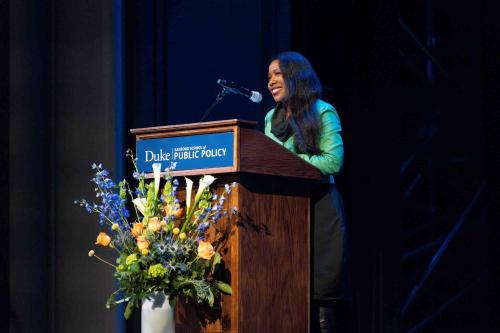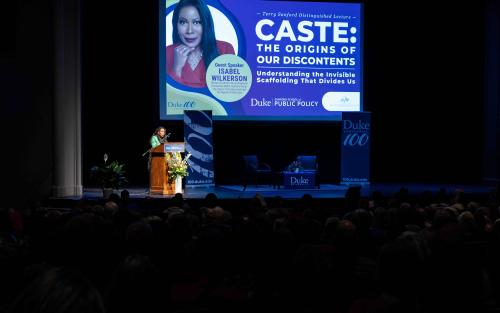
Isabel Wilkerson, an esteemed American journalist and author, visited Sanford recently to meet with students and present the 2024 Terry Sanford Lecture. Before addressing a packed audience at Page Auditorium, Wilkerson took time to meet with students from Sanford’s Policy In Living Color student organization, as well as students from Duke’s Mary Lou Williams Center For Black Culture. During that insightful discussion, she explained her love of research, the inspirations for her best-selling books, and the origins of her signature mixture of personal storytelling and fact-based historical accounts. Wilkerson rose to prominence with her groundbreaking works of narrative nonfiction and history.

Born in Washington, D.C., and a graduate of Howard University, Wilkerson's career in journalism included notable positions at The New York Times, recognized with the Pulitzer Prize in 1994, becoming the first woman of African-American heritage to win the award in journalism.
Her debut book, "The Warmth of Other Suns: The Epic Story of America's Great Migration," garnered widespread acclaim for its exploration of the mass migration of African Americans from the South to the North and West. This seminal work earned her numerous awards and established her as a leading voice on social justice in America.
In her latest book, "Caste: The Origins of Our Discontents," Wilkerson delves into the concept of caste systems and their enduring influence on American society. Drawing parallels between the caste systems of India, Nazi Germany, and the United States, the book offers profound insights into the structural inequalities and systemic injustices that persist in contemporary America. It
was also the basis for this lecture.
Wilkerson’s meticulous research and compelling storytelling were fully displayed as she visited Sanford. Challenging students and audience members to confront the entrenched hierarchies that perpetuate discrimination and division.
Highlighting her important work
The lecture began by delving into America's historical roots, revealing their deep entanglement with racial oppression. Through this examination, Wilkerson illuminated the striking resemblance between American slavery (including post-slavery Jim Crow) and India's caste system. She highlighted the turbulent nature of American history, marked by revolutions, the Civil War, and struggles for civil, women's, and immigrant rights. Despite gains, Wilkerson emphasized their vulnerability to erosion, prompting a focus on unresolved issues.
Wilkerson noted that her book "Caste" was facing scrutiny in Texas. Reflecting on democracy, she shed light on the recent history of Black voting participation, underscoring the novelty of
democratic gains for many. Using a striking analogy, Wilkerson likened the American caste system to a pre-existing medical condition, suggesting its predictability despite the shock it may provoke.
Jim Crow as a catalyst for the Great Migration
Wilkerson's distinct talent for intertwining individual narratives with historical context was evident in her discussion of the Great Migration. This period was a significant inspiration for her works "Warmth of Other Suns" and "Caste." She emphasized the profound impact of the Great Migration, highlighting how millions of African Americans, from the South, felt compelled to leave their homeland. Rather than a mere relocation, Wilkerson portrayed this migration as a desperate act akin to seeking political asylum within one's own country. Wilkerson provided concrete examples of the risks faced by Black Americans in their daily lives under Jim Crow laws. She illustrated the absurdity of segregation through instances such as the prohibition of interracial games like checkers, showcasing the pervasive discrimination of the era.

How the Caste system presented in America
Wilkerson explored the comparison between the Indian social structure and America's, describing the caste system as a rigid hierarchy determining human worth, enforcing strict divisions, often to extreme extents. She highlighted the severity of racial segregation in America, citing laws that persisted into the 1970s, such as prohibiting Black motorists from overtaking
white motorists. Using an analogy, Wilkerson drew parallels between the concept of "cast" without an "e" and the caste system, emphasizing the rigid roles enforced in society.
To further illustrate her point, she recounted Dr. Martin Luther King, Jr.'s visit to India, where he empathized with the Dalit community's plight, equating their marginalization with that of African Americans. She emphasized the universality of caste systems, noting that arbitrary factors like ethnicity, religion, language, and place of origin could determine one's societal ranking.
Unresolved hate still affects America today
Wilkerson recognized the enduring link between historical slavery and the contemporary plight of African Americans, highlighting its persistence in society. She discussed how slavery laid the groundwork for a system of oppression, evolving into Jim Crow laws and continuing to influence modern-day injustices. She referred to recent incidents of violence against unarmed Black individuals, which have become commonplace in the media, citing the killing of George Floyd as a stark example. Later, she contrasted this with the leniency shown towards the January 6 rioters at the Capitol, noting the disparity in treatment and emphasizing the tragic loss of George Floyd's life.
Understanding the unreconciled history of American racism
Advocating for immediate action, Wilkerson continued to propose ways past events can guide present decisions. She critiqued the tendency to view slavery merely as a regrettable episode in American history, asserting that it underpins the nation's political, social, and economic structures. Wilkerson highlighted the significant time disparity between African Americans' enslavement and their subsequent freedom, emphasizing the unresolved nature of this legacy. She then drew parallels between the Jan. 6 rioters and the historical roots of caste in America, noting that a contemporary protester had managed to get the Confederate flag inside the U.S. Capitol. This, she suggested, underscores the enduring consequences of America's divisive history and the systemic fractures inherited by the nation.
Seeing hope for the future from the people of the past
As her presentation ended, Wilkerson sought to instill hope and encouragement into a challenging topic. She revisited the historical figures who paved the way, emphasizing her source of optimism amidst difficulty. Rather than dwell on the hardships, she drew inspiration from unknown ancestors who endured the Middle Passage and slavery. Their resilience, she believed, demonstrated humanity's capacity to overcome adversity. Wilkerson urged learning from their experiences and emphasized the potential within each individual to contribute to a more just society, highlighting the power within every person.
Before the multiple standing ovations her lecture inspired, Wilkerson ended her talk with a reference to a powerful figure that has shaped her path. “I want to leave you with the words of Richard Wright, who was one of the great novelists of the 20th century. In some ways, he was the poet laureate of the Great Migration. He wrote these words as a whisper. As a prayer as an encouragement to those of us alive today that whatever it is that we can set our sights on whatever it is that we can imagine a different world, a fairer world, a more equitable world, a world in which people can somehow transcend and bridge, the divisions that we now face that if. We can picture it. It is possible. He wrote: ‘I was leaving the South to fling myself into the unknown . . . I was taking a part of the South to transplant in alien soil, to see if it could grow differently, if it could drink of new and cool rains, bend in strange winds, respond to the warmth of other suns and, perhaps, to bloom.’"

Moderated discussion with Sanford MPP Student
The night ended with a few questions submitted from the audience, moderated by Sanford Master of Public Policy student Brittany Gabriel, who also led the earlier student meeting. During this lighthearted conversation, Wilkerson spoke of the 15 years of research and the over 1,200 people she interviewed to write her first book, “The Warmth of Other Suns.” The discussion also led to anecdotes about how personal accounts are integral to accurate history, how participating with traditions can enrich storytelling, and even how The Matrix inspired a portion of her work. The 2024 Sanford Lecture was a resounding success delivered by a generational author and leader. Wilkerson's poignant words transcended mere analysis and served as a potent call for introspection and societal change. Her commitment to illuminating marginalized narratives and fostering empathy across racial divides underscores her significance as a transformative voice in American literature and social commentary.
Wilkerson Lecture: Student Perspective
"Attending the Sanford Distinguished Lecture featuring Isabel Wilkerson, followed by the inaugural Black Policy Conference, provided profound insights into the complexities of our past and present." - Omolayo Ojurongbe MPP'24
Policy 360 Podcast
A Conversation With Writer Isabel Wilkerson
During her visit to Duke, Wilkerson recorded a conversation with Sanford's dean Judith Kelley for the Policy 360 podcast.
